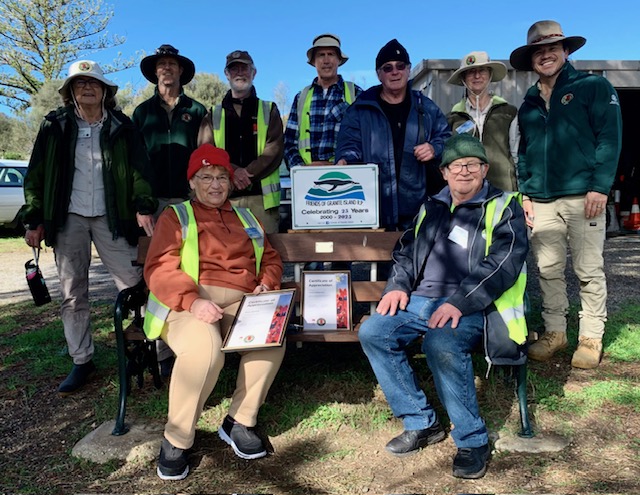Guardians of Granite Island
Staff Reporters
16 November 2025, 2:00 AM

Words: Susie Williams
Thanks to Coast Lines magazine
Guardians of Granite Island: 25 years of community, conservation and cultivation
Just across the Causeway from Victor Harbor lies Granite Island—known as Kaiki in the Ngarrindjeri language—a wind-battered, rugged stretch of land shaped by time and tides. For the past 25 years, a quiet group of volunteers has been helping shape its future. The Friends of Granite Island, or FOGI, have spent every Wednesday morning—rain, shine, or sea mist—pulling weeds, planting natives, guiding school groups, and nurturing biodiversity. Their mission is simple: restore the island’s natural ecosystem, one plant and one conversation at a time.
FOGI is one of more than 140 community groups across South Australia that form the Friends of Parks and Nature network. Backed by the Department for Environment and Water and working alongside the National Parks and Wildlife Service, these volunteer groups form the living, breathing heart of conservation in the state. Each group, like FOGI, brings passion, local knowledge and persistence to the long-term care of parks, reserves and coastline.
Among the familiar faces on the island is Stephen Hedges, a long-time tour guide and BirdLab field assistant. Stephen began working with penguins on the island in 2001 and has been a regular part of FOGI’s efforts ever since. He speaks about the landscape with a kind of reverence—as something both fragile and enduring. “There are old photos from a hundred years ago where the island was completely cleared,” he says. “No trees, no shrubs—airplanes even used to land on top. What we’re doing now is trying to reverse that, to give the land some of its strength back.”

Revegetation lies at the heart of this mission. Over the years, volunteers have worked hard to remove invasive species and replace them with hardy native sedges, saltbush, and low-growing coastal shrubs that can thrive in the island’s tough conditions. The work isn’t glamorous—it’s muddy, repetitive and often wind-whipped. But the results, as Stephen points out, are slow and deeply satisfying. “Plants don’t shout for attention,” he says, “but if you look back over time, suddenly it’s greener, softer, more alive.”
FOGI’s work isn’t just for the environment—it’s also about people. Local school groups regularly visit the island as part of a hands-on education program supported by grants and community partnerships. The process begins in the classroom, with lessons about the link between land and sea, and ends on the island with students digging, planting and learning from experience. “It’s a highlight for all of us,” says Stephen. “To see kids kneeling in the dirt, planting a future, learning how everything connects—it stays with them. Some may come back as adults and remember the exact spot where they planted something.”
There’s also something quietly powerful in the diversity of experiences and knowledge each volunteer brings. “It’s not just what we do, but who we are. Everyone brings their own background and insight—people you might not meet otherwise.” He speaks especially of Andrew, one of the founding members, a retired geology school teacher and the grandson of the island’s former harbourmaster. “He’s fired a whole new interest in me about the island’s rocks and history—how the past shapes the present, not just in the soil, but in the stories we share. That kind of connection is what makes this group special.”
That sense of connection—between people, place, and purpose—was at the heart of FOGI’s 25-year celebration earlier this year. The group marked the occasion with a planting morning, service awards, and the unveiling of a commemorative plaque. Founding members Andrew and Heather Jeffery, still active in the group, were honoured alongside long-serving volunteers including Stephen. “These aren’t just milestones,” he says. “They’re proof that community care works. That passion and patience can outlast almost anything.”
FOGI also has plans to bring art into their work, with murals on the island’s utility shed featuring native animals and birds. For Stephen, who was a teacher in a past life, the idea blends creativity with education—another way to connect visitors with the life that’s slowly returning to the island.
The group welcomes volunteers of all backgrounds and skill levels. No experience is necessary—just a willingness to help and an appreciation for nature. Working bees are held every Wednesday morning, typically from 8am to 10am. Tools and good company are provided. For those who can’t join in person, donations are always welcome and go directly toward native plants, educational materials and signage.
In an era where conservation often feels like a race against time, the work on Granite Island reminds us that sometimes the most meaningful change comes quietly. A tree planted. A weed removed. A conversation started with a curious visitor. These small acts, repeated over weeks and years, add up to transformation.
Stephen says it best: “Every plant we add is a promise—to the land, to the future, to each other. “
Interested readers can contact Jean Flamank (mob: 0488 185 484) or visit the Friends of Parks SA website to learn more about joining or supporting a local group.
https://friendsofparkssa.org.au/members/members-directory/friends-of-granite-island-recreation-park/